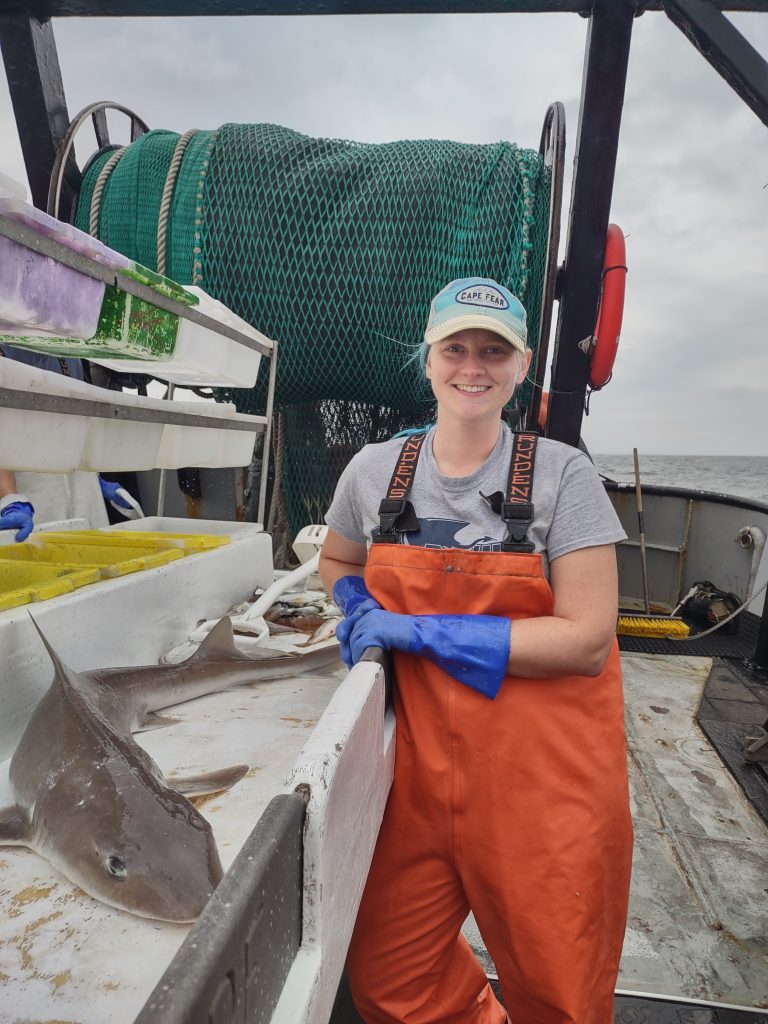CFCC Marine Tech grad hits the high seas
 Natalia Renfrew wakes up every morning in love with her job. Despite occasionally rough seas and seasickness, Natalia is thrilled to work in the marine sciences, commenting, “It’s everything I ever wanted.”
Natalia Renfrew wakes up every morning in love with her job. Despite occasionally rough seas and seasickness, Natalia is thrilled to work in the marine sciences, commenting, “It’s everything I ever wanted.”
After graduating from CFCC’s Marine Technology program, she was hired by the Virginia Institute of Marine Science (VIMS) in Gloucester Point, VA. VIMS is a research and education institution that conducts research from inland waters to the open ocean, focusing on coastal water passages. In between research cruises, Natalia told us about her experience at CFCC.
WHAT PROGRAM WERE YOU IN AND WHAT YEAR DID YOU GRADUATE?
I was in the Marine Technology program from August 2019 to and graduated in December 2021. I walked with the May 2022 ceremony.
WHY DID YOU CHOOSE CFCC? WHY DID IT MAKE SENSE FOR YOU?
I chose CFCC for the marine technology program! I’ve always wanted to be a marine biologist and thought about attending UNCW to study marine biology. But, during my research, I discovered CFCC’s marine technology program, their hands-on training, and job placement assistance. I decided that was the best way to start. After meeting face-to-face with Marine Technology Department Chair Jason Rogers to learn more, I moved to Wilmington with my boyfriend and three cats from Richmond, VA.
SPECIAL MEMORIES ABOUT CLASS AND/OR INSTRUCTORS?
My instructors in the classroom and the field were always ready to answer questions and set aside time for one-on-one meetings. They’re personable, intelligent, and talented people. The crew members are excellent teachers who are kind and patient. I am forever thankful to have worked with everyone.
IF YOU ENTERED THE WORKFORCE AFTER GRADUATION, DID YOU FIND WORK IN YOUR CHOSEN FIELD?
Yes! I get to wake up and tell people, “I’m a marine biologist.” And it’s incredible. I was hired by the Virginia Institute of Marine Science (VIMS) for their North East Area Monitoring Assessment Program (NEAMAP). NEAMAP surveys fish populations and collects biological samples such as otoliths, vertebrae, stomachs, and ovaries. My coworkers are fun, professional, and know how to share their knowledge. I’ve completed my first research project on the Darana R, a commercial fishing vessel. Now I’m working on a similar project in the Chesapeake Bay.
HOW DID CFCC PREPARE YOU FOR EITHER OF THOSE TRANSITIONS?
I’ve already been exposed to almost everything I’m doing at my new job as a field and research specialist during my time at CFCC. Living and working on the R/V Cape Hatteras gave me the confidence to do the same for VIMS.

